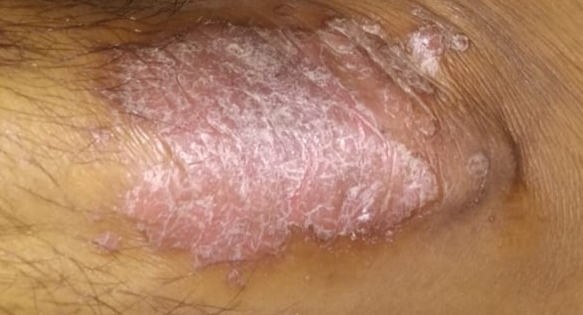Diseases

Psoriasis
Psoriasis is a chronic autoimmune skin condition characterized by the rapid buildup of skin cells that leads to the formation of red, raised, and scaly patches on the skin. In Ayurveda, psoriasis is often referred to as "EkKushtam." Ayurvedic management of psoriasis aims to address the underlying imbalances in the body, strengthen the immune system, and promote skin health. It's important to consult with a qualified Ayurvedic practitioner before starting any treatments.
Here are some Ayurvedic approaches that are commonly used to manage psoriasis:
**1. Balancing Doshas:**
- Psoriasis is often associated with the imbalance of Pitta and Kapha doshas. The treatment focuses on pacifying these doshas and promoting their balance.
- Avoid foods that are too spicy, oily, and sour, as they can aggravate Pitta dosha. Include foods that have a cooling and anti-inflammatory effect.
**2. Diet and Nutrition:**
- Consume a diet rich in fresh fruits, vegetables, whole grains, lean proteins, and healthy fats.
- Include foods with anti-inflammatory properties, such as turmeric, ginger, and green leafy vegetables.
**3. Herbal Remedies:**
- Neem (Azadirachta indica) is a well-known herb in Ayurveda with antifungal, antibacterial, and anti-inflammatory properties. It may be used topically or internally.
- Guggul (Commiphora wightii) is believed to have immune-modulating properties that can be beneficial for autoimmune conditions like psoriasis.
**4. Panchakarma Therapies:**
- Panchakarma, a series of detoxification and rejuvenation therapies, may be recommended under the guidance of an Ayurvedic practitioner. These therapies aim to remove toxins from the body and restore balance.
**5. External Treatments:**
- Herbal oils and pastes can be applied to the affected areas to soothe inflammation, reduce scaling, and promote skin healing.
- Warm baths with herbs like neem or Epsom salts can help soften plaques and alleviate itching.
**6. Stress Management:**
- Stress can exacerbate psoriasis symptoms. Practicing relaxation techniques, meditation, and yoga can help manage stress levels.
**7. Avoiding Triggers:**
- Identify and avoid factors that trigger psoriasis flare-ups, such as stress, alcohol, smoking, and certain medications.
**8. Lifestyle Modifications:**
- Maintain a regular routine that includes adequate sleep, exercise, and relaxation to promote overall balance.
**9. Patience and Consistency:**
- Ayurvedic treatments for psoriasis may take time to show results. Consistency and patience are important.
It's important to work with a qualified Ayurvedic practitioner to develop a personalized treatment plan based on your unique constitution (Prakriti) and imbalances (Vikriti). Ayurvedic treatments has proven results but it's important to do so under proper guidance.
